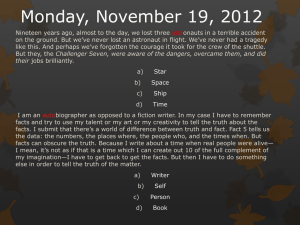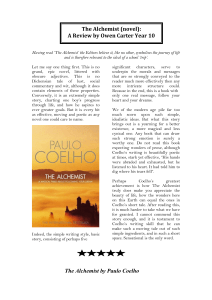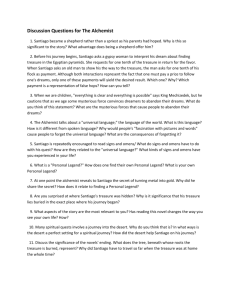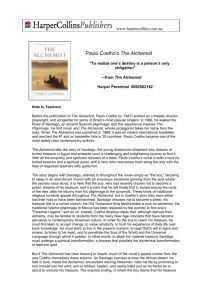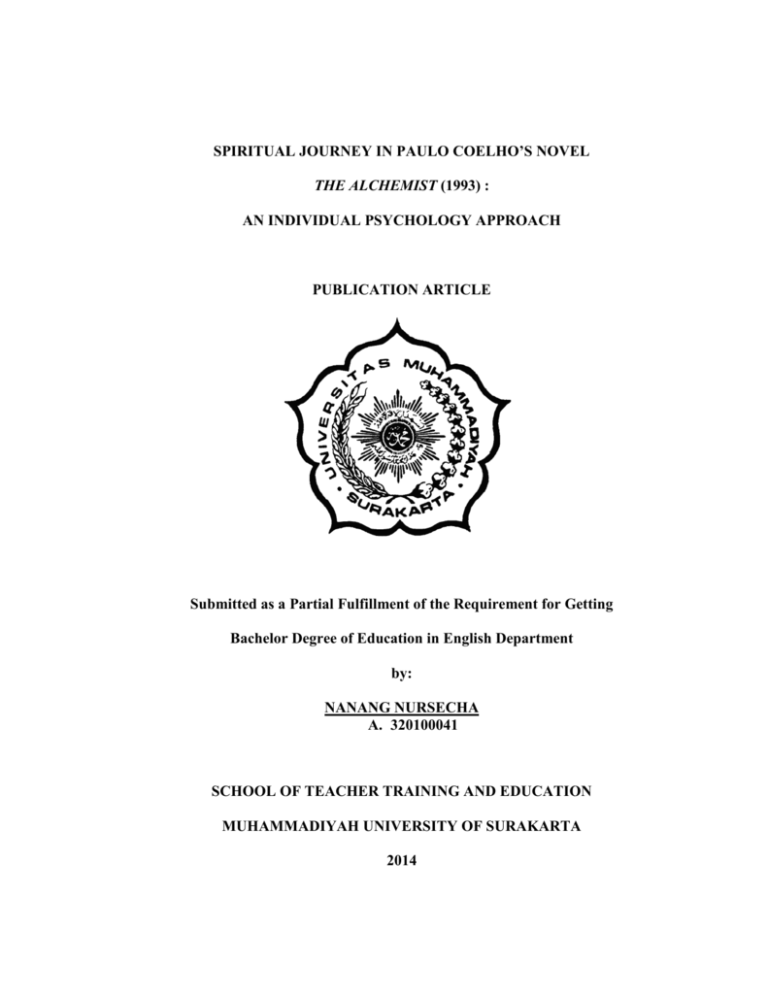
SPIRITUAL JOURNEY IN PAULO COELHO’S NOVEL
THE ALCHEMIST (1993) :
AN INDIVIDUAL PSYCHOLOGY APPROACH
PUBLICATION ARTICLE
Submitted as a Partial Fulfillment of the Requirement for Getting
Bachelor Degree of Education in English Department
by:
NANANG NURSECHA
A. 320100041
SCHOOL OF TEACHER TRAINING AND EDUCATION
MUHAMMADIYAH UNIVERSITY OF SURAKARTA
2014
SPIRITUAL JOURNEY
IN PAULO COELHO’S NOVEL THE ALCHEMIST (1993):
AN INDIVIDUAL PSYCHOLOGY APPROACH
Nanang Nursecha
A 320100041
nanang.nursecha@gmail.com
Muhammadiyah University of Surakarta
ABSTRACT
This research paper is aimed to show visible image of Paulo Coelho’s novel
which is analyzed by using individual psychology approach. The objectives of
the research are to analyze the novel based on the structural elements and to
analyze the novel based on individual psychology approach proposed by
Alfred Adler. This research belongs to qualitative research. Data of the
research are divided into two, primary data and secondary data. The primary
data of the research is The Alchemist novel and secondary data of the
research are biography of the author, websites, and other source about
individual psychology approach that support the analysis. The method to
analyze this data is descriptive analysis. The researcher comes to conclusion
as follows. Based on individual psychology approach analysis, Paulo Coelho
illustrated psychological phenomena in that an individual has experienced
spiritual journey. The outcome of the study shows that Paulo Coelho
illustrates psychological phenomenon when an individual experiences when
he is travelling to get treasures. In the search for treasure, he finds something
more important than the material that is high spiritual level.
Keyword: spiritual journey, the alchemist, individual psychology
approach
1
A. Introduction
The Alchemist is a novel by Paulo Coelho, first published in
Portuguese with a title O Alquimista in 1988. This novel has been translated
into English by Alan R. Clarke in 1993, and published by HarperCollins
Publishers. It has been translated into 56 languages as of September 2012. The
Alchemist is an allegorical novel. This novel contains 192 pages. The main
character in this novel is Santiago, the shepherd boy from Andalusia. Overall,
this novel tells the story about Santiago who travels from Andalusia to Egypt
to find treasure.
There are three reasons why the researcher interested to analyze this
novel. First reason is because the researcher is interested in the story of
philosophy, adventure and spirituality. Second reason is because the major
character is a simple shepherd boy who is able to achieve his dream for most
people is probably impossible. The last reason, this novel bring the researcher
to the past is when the Andalusian era still prevail. This is very interesting,
because we can know the history of that place.
The problem statement is the spiritual journey experienced by the
major character in The Alchemist novel. The researcher will analyze the novel
based on structural elements of the novel and spiritual journey experienced by
the main character in this novel using Individual Psychological Approach.
Objectives of study in this research are divided into two parts. The first is to
analyze Paulo Coelho’s Novel The Alchemist (1993) based on its structural
elements. The second is to analyze Spiritual Journey in Paulo Coelho’s Novel
The Alchemist (1993) based on individual psychology approach.
In this study of this novel, the researcher is not the first to examine this
novel. There are some who have examined this novel previously; here are
some of these people. The first is by Oktavida Wijayanti that analyzed The
Influence of Setting towards Santiago’s Characteristics as seen in Paulo
Coelho’s The Alchemist. That study was conducted in 2007. Her study
2
focused on the intrinsic element of main character in this novel, which is
Santiago. The second study is from Nuri Aprillia Ramadhona student of
University of Indonesia. Her title of the study is Analysis of persuasion
strategies ad identity of Santiago’s character in The Alchemist novel : an
approach of critical discourse analysis. Her research focused on three points;
strategies of persuasion practiced by persuaders in the narrative; power
relations among characters; and Santiago’s identity in the whole persuasive
discourse. The last research is by Umi Akhiriyah, a student from Ahmad
Dahlan University: Yogyakarta. Her title of the study is THE STRUGGLE OF
SANTIAGO TO FIND THE TREASURE IN PAULO COELHO’S THE
ALCHEMIST. Her research intended to describe the intrinsic element of the
novel and to describe the moral values revealed from the novel.
The difference of this present research from the previous research is
the focus of the study that is, spiritual journey in the story of The Alchemist
novel. The researcher uses individual psychology approach to analyze.
Individual psychology is the most suitable approach to analyzing about the
issue of spiritual journey. Researcher’s title is Spiritual Journey in Paulo
Coelho’s Novel The Alchemist (1993): An Individual Psychology Approach.
In this study, the researcher uses some literary review to help
researcher in analyzing this novel. To analyze the structural element of this
novel, the researcher use literary review from Koesnosoebroto (1998) and
Kennedy (1963). Literary review from Hall and Lindzey (1981), Hjelle and
Zigler (1992) and Cloninger (2009) are use in individual psychology analyze.
The researcher needs to analyze psychology of the author, so the researcher
uses literary review from Wellek and Warren (1962) to analyze the
psychology of literature.
3
B. Research Method
In this research, the researcher uses qualitative research because there
is no need a calculation. It aims to analyze The Alchemist novel using
individual psychology approach. The primary data source is the novel and the
secondary data source is other works or any information that related to the
study. Both data are collected through library research and access internet.
The technique that is use for analyzing the data is descriptive qualitative
method. It means that the researcher describes the text and content analysis to
get the characteristic of the data to individual psychology approach analysis of
the novel The Alchemist. Then the researcher interprets those data through the
study.
C. Research Finding and Discussion
1. Research Finding
a. Individual Psychology of Santiago
1) Fictional Finalism
Based on Alfred Adler’s theory (Cloninger, 2009: 103 )
defines fictional finalism as “a subjective experience rather
than an object reality. It gives direction to the individual’s
striving. Because an individual’s fundamental motivation is to
move toward this fictional finalism, a person cannot be
understood without knowing the unique goal. Once it
understood, it explains the consistency of a person’s striving”.
Analysis conducted by researcher may be a bit
complicated. Researcher divided into two sections each basic
concept in theory of individual psychology. Researcher does
this because the issue is taken in this study implied in this
novel that is spiritual journey. Spiritual journey experienced by
Santiago is a coincidence that he experienced by looking for
treasures.
4
The first fictional finalism that is reflected in this novel
Santiago wants to be a rich man by looking treasures. Second,
the real treasures aren’t materials but understanding of life,
happiness and spiritual.
2) Inferiority Feeling
Based on Adler in Hjelle & Ziegle (1992) describe
inferiority feelings and compensation that “each individual,
certain organs are somewhat weaker than other, making the
person more susceptible to illnesses and diseases involving
these organs” (Hjelle & Ziegler, 1992: 141). In their book,
Adler assumed that “every person succumbs to disease in that
region of the body which has been less well-developed, less
successfully functioning, and generally “inferior” from birth”
(Hjelle & Ziegler, 1992: 141).
The inferiority feeling in this novel cause by the
economic imperfection that experience by Santiago. Santiago
is a son’s of the poor farmer in the Andalusia. He feels inferior
because he can’t reach his happiness. He thinks that happiness
comes from the material or money. The inferiority feeling
which experience by Santiago depicted in this novel.
Santiago’s inferiority feeling in his spiritual journey is spiritual
imperfection. He thinks that knows about God doesn’t really
important than traveler around the world. He doesn’t know that
travel around the world without knows about God is an attitude
of arrogance. This is depicted in this novel.
3) Striving for Superiority
Hjelle & Ziegler (1992: 143) define striving for
superiority in explanation of Adler as “fundamental law of
human life a something without which life would be
5
unthinkable. Adler believed that the striving for superiority is
innate and that we are never free of it because it is life itself”.
He thinks that happiness comes from material or
money. So, he strives to get a lot of money and become a rich
person. He dreams that any treasures in the Egypt. He wants to
realize his dream. One of his struggles to get his treasures is by
asking to the oracle about his dream. It’s depicted in this novel.
He is also helped by a king of Salem to know about his
treasures. The king gives him some advice how to get the
treasures.
In his effort to be superior in his spiritual journey, he
has to understand about universal language. Universal
language is a language without words that use and understand
by all creatures. He realizes that in his journey, he begins to
learn and understand about universal language. It’s depicted in
some parts in this novel. The other aspects of striving for
superiority in Santiago showed when he gets the understanding
about Soul of the World. Understanding soul of the world
becomes an important aspect in his successful in his spiritual
journey. Soul of the world is a place where all of creatures life
in the next life, soul of the world also a place where all of the
energy in the entire world life in. if he understand soul of the
world, he also can be the part of it. So, his effort to reach his
personal legend becomes easier.
4) Social Interest
Hjelle & Ziegler (1992: 147) quoted Adler’s theory that
“we humans are social creatures-that we must consider our
relationship to other and to the larger sociocultural context in
which we live if we are to fully understand ourselves”.
6
“Development of social interest takes place in a social
environment”.
Santiago wants to get the treasures, so he communes
with people who can help him to get it. The treasures are at
Egypt, he always looking for people who can deliver him to
there. Social interest of Santiago depicted in this novel. He
joins with the caravan that can help him goes to Egypt.
Santiago also aided by the alchemist, the alchemist is very
important role in helping Santiago finding her Personal
Legend. This is reflected in this novel.
The social interest aspect in his spiritual journey in the
novel has shown when Santiago meets Melchizedek. He learns
much more about what soul of the world it is. Santiago also
communes with the camel driver, his friend in the caravan. He
teaches Santiago about why we have to accept destiny.
5) Style of Life
Hjelle & Ziegle (1992: 144) explain style of life in their
book that is “concept, idiographic, in nature, that identifies the
person’s unique mode of adaptation to life, most notably
including the person’s self created goals and means of
achieving them”.
Santiago’s style of life is about how to be a rich man.
Santiago does some effort in order to be rich. His effort
reflected in this novel. In order to be rich, the first think that he
tries to be a shepherd. After become a shepherd, then he work in
the crystal shop. That is depicted in this novel. Being a shepherd
and crystal shop assistant cannot make him rich. Then he finds
another alternative that is by looking for treasure. He knows
7
there is a treasure somewhere through a dream. Then he was
looking for the treasure.
The style of life in the novel is depicted through
Santiago’s style of life. Style of life is something that he likes
from child and it can’t be change. His style of life is he always
wants to adventure and seek something new. It’s depicted in
this novel. His adventure brings him to the deeper meaning of
life.
Santiago type life-style belongs to the socially useful
type. Because he is a person with this type expresses with
genuine concern for and fellowship with other people. Another
reason is because Santiago likes to help others.
6) Creative Self
Creative self is the subordinate construct in Adler’s
theory, his ultimate achievement as a personologist. Adler
maintained that the style of life is “shaped by the person’s
creative power” (Hjelle & Ziegler, 1992: 150).
The creative self shows in the novel when Santiago has
brilliants idea that never thought by other people to develop her
business.
2. Discussion
As a human being, Santiago wants to live happily. One way that he
thinks he can be happy is to be rich, that is by looking for treasure.
However, over time, the perception of happiness has change; he thinks
that happiness is not only of material but also of inner peace. Therefore
Santiago does spiritual journey.
The inferiority feeling arises because of the economic and spiritual
imperfections. The economic imperfection that is he comes from a poor
8
family, but he wants to be rich. The spiritual imperfection that he doesn’t
really believes in God, but he wants to be close to God.
The responses of his inferiority feelings, he does many effort to be
superiority. He struggles to be rich man by looking for treasures. He does
everything to reach his personal legend. To make easier in his journey, he
has to learn and understand about universal language and soul of the
world.
Santiago wants to be rich man and he wants to be close with God. So, the
social interest of Santiago that is he always communes with people who
can help him to be rich and close with God.
Santiago Style of life is about how to be rich that is by looking for
treasures. He takes a long journey to Egypt to get the treasures. In
addition, he also did anything, of course the way to be closer to God.
Santiago is a creative person. It has proven when Santiago works in
the crystals shop. He has a lot of idea and innovation to increase the
income of that shop.
The psychological analysis above shows that personality development of
the major character, Santiago is influenced by his desires to reach his
personal legend. His struggle to reach his personal legend reinforces his
personality of Adler’s Individual psychology is connected to each other
and builds a unity from Santiago personality through his great struggle to
reach his personal legend.
Based on the analysis in the previous chapter, according to the theory
of Christensen (2003) states that “some form of travel, physical or mental,
which may occur over a long or short period of time, and might be any
distance or to a specific location” (http://www.wisegeek.com/what-is-aspiritual-journey.htm). She also defines the purpose of spiritual journey is
“spiritual enlightenment or understanding, and this could mean a person
has greater faith, understands a spiritual path better, or simply feels
9
mentally and emotionally refreshed”(http://www.wisegeek.com/what-is-aspiritual-journey.htm).
There are several goals of spiritual journey that is depicted in this
novel. The first, spiritual enlightenment or understanding, and this could
mean a person has greater faith, understands a spiritual path better, or
simply feels mentally and emotionally refreshed. Second, Santiago wants
to better understand what he really wants. Third, Santiago wants to get
closer with God.
Santiago gets various benefits after doing a spiritual journey. First, he
becomes more careful in thinking and acting. Secondly, Santiago became
a better person and wiser. Third, Santiago gets a peace of mind after doing
a spiritual journey.
The cause Santiago doing the spiritual journey is actually a
coincidence. In the beginning, Santiago just wants to find the treasure.
However, over time and meet some people, without he realizing he has
done a spiritual journey.
As a result of doing the spiritual journey is Santiago becoming a better
person. He gets a material and spiritual happiness. In the form of material
that he has gained over the treasure he was looking for, it certainly
improved the economics of the family. However happiness is most
important is that he has succeeded in doing a spiritual journey. It certainly
makes getting peace of mind.
According to Wellek and Warren (1962), psychology of literature
means “the psychological study of the writer, as type and as individual, or
the study of the creative process, or the study of the psychological types
and laws present within works of literature or the effects of literature
upon its readers or audience psychology.” The relation between literature
and psychology is literature can affect the feeling and personality of the
readers. So, Paulo Coelho writes The Alchemist as one of literary work to
10
show his condition at that time and he wants to give motivation to the
readers to get better situation with always struggle and have positive selfconcept even though in bad circumstance.
D. Conclusion
Based on the analysis and discussion in the previous chapter, this
study comes to the following conclusion. Firstly, based on structural analysis,
it can be concluded that in this novel, the author delivers a message that a
spiritual journey can make people wiser in thought and action. So, Paulo
Coelho brought character and characterization I such way to prove the
spiritual journey. Setting of place in this novel in Andalusia, Spain and in
Egypt; setting of time in this novel around 15th-17th centuries. Paulo Coelho
uses traditional plot in order that reader can be easier to understand the novel;
and the story is interconnected between one part to another part. The author
uses third-person point of view because he uses personal pronoun and
character’s name.
Secondly, based on the psychological analysis it can be concluded that
is the novel, the author illustrates the psychological phenomenon in which a
person of the major character. Santiago is influenced by his desires to reach
his personal legend. His struggle to reach his personal legend reinforces his
personality of Adler’s Individual psychology is connected to each other and
builds a unity from Santiago personality through his great struggle to reach his
personal legend.
Pedagogical problems were found in this novel is that there are some
people who are not able to achieve their goals or personal legend. This is
because the doubt that they are able to make it happen. Moreover, because of
their lack of support from others that they are able to do so. The impact of
these things is they are easily satisfied with what was achieved even though
that is not the real desires. The solution is to convince yourself to be able to
achieve what we want, to get the support of people around, and increase our
11
knowledge. The parties involved are family, friends and the community
around.
E. References
Akhiriyah, Umi. 2008. THE STRUGGLE OF SANTIAGO TO FIND THE
TREASURE IN PAULO COELHO’S THE ALCHEMIST.
http://archive.eprints.uad.ac.id/skripsi/pbinggris/041030040382008SKRIPSI-UAD-PENDIDIKAN%20BAHASA%20INGGRISTHE%20STRUGGLE%20OF%20SANTIAGO.pdf accessed on
December 23, 2013
Carolyne
Fynn.
2013.
Biography
Paulo
Coelho.
http://www.humanities360.com/index.php/biography-paulo-coelho-4483/
accessed on December 16, 2013
Christensen,
Tricia
Ellis.
2003.
What
is
a
spiritual
jorney?
http://www.wisegeek.com/what-is-a-spiritual-journey.htm accessed on
December 10, 2013.
Cloninger, Susan C. 2009. Theories of Personality: Understanding Person.
Pearson Prentice Hall: New Jersey.
Coelho, Paulo. 1993. The Alchemist. Australia: HarperCollins Publishers.
Corbett, Bob. 2009.
http://www2.webster.edu/~corbetre/personal/reading/coelhoalchemist.html accessed on January 25, 2014
Hall, Calvin S and Linzey, Gardner. 1981. Theories of Personality. New
York: Capman and Hall.
Hjelle, L.A and D.J Zigler. 1992. Personality Theories: Basic Assumption,
Research and Application. United States of America: Mc Graw Hill
International.
Kennedy, X.J. 1963. Literature: An Introduction of Fiction, Poetry and
Drama. Canada: Litle Brown.
12
. 1983. An introduction of Fiction, Poetry and Drama. Canada:
Little, Brown & Company Canada Limited.
Koesnosoebroto, Sunary Basuki. 1998. The Anatomy of Prose Fiction.
Jakarta: Depdikbud.
Ramadhona, Nuri Aprillia. 2012. Analysis of persuasion strategies and identity
of Santiago’s character in the alchemist’s novel: an approach of critical
discourse
analysis.
http://lontar.ui.ac.id/file?file=pdf/abstrak-
20314450.pdf accessed on December 23, 2013
Sparta, Kelle. What is a spiritual journey? http://www.kellesparta.com/whatis-a-spiritual-journey/ accessed on December 10, 2013.
Wellek, Rene and Austin Warren. 1962. Theory of Literature. New York: A
Harvest Book.
Wijayanti, Oktavida.2007. The Influence of Setting towards Santiago’s
Characteristics as seen in Paulo Coelho’s The Alchemist.
http://www.library.usd.ac.id/Data%20PDF/F.%20Sastra/Sastra%20Inggri
s/994214001.pdf, accessed on December 23, 2013
13

